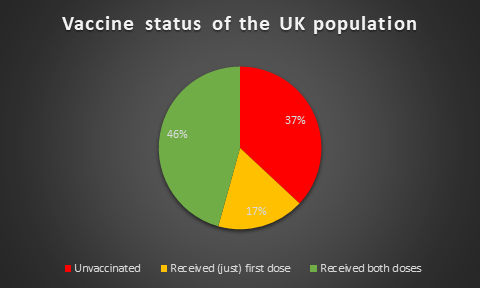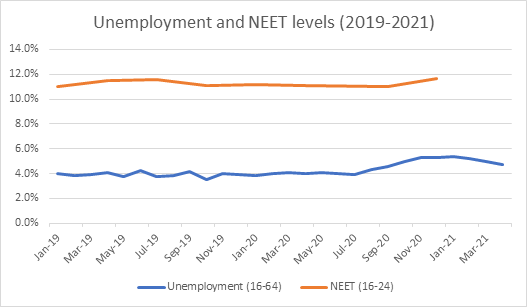This is the 56th of a series of bulletins produced by ISE to update members on key data and policy related to Covid-19. This bulletin covers the period 3rd June – 16th June 2021.
You can access all of the Covid-19 bulletins on ISE insights.
Latest Covid-19 data

Data taken from Wikipedia and from the government’s Covid-19 dashboard.
The UK has now had over 4.5 million identified Covid-19 cases and 152,000 deaths (with Covid on the death certificate).
The number of cases have now been rising for six weeks although deaths remain low.
Covid news

Data from the government’s Covid-19 dashboard.
- The government have delayed ‘freedom day’ by four weeks in response to the fact that Covid cases are growing faster than any time since the winter. Research has demonstrated that the Delta variant is about 60% more transmissible than the Alpha variant.
- Data published by The Guardian shows why the Delta variant has been able to spread despite the vaccine.
- New statistics published by the Economist suggest that there have been between 7-13 million excess deaths worldwide during the Covid-19 pandemic.
- The Pfizer vaccine has been approved for children.
Education
- Kevan Collins, who had been leading the government’s plans on a recovery for education, has quit, arguing that the government are putting insufficient investment into catch up.
- Many universities are planning to deliver lectures online during autumn 2021. Jim Dickinson argues that it is important that this change is not imposed on students without consultation.
The labour market

Drawing on Office for National Statistics data on unemployment and NEET levels.
- There is growing evidence that the labour market it recovering well with vacancy numbers growing and the ONS showing that they are continuing to grow. This may even be leading to a shortage of workers in some areas.
- Rishi Sunak has rejected calls to extend furlough.
- Tristram Hooley argues that things are also looking up for the student labour market, with confidence staying stable and then takes a look forward to September.
- Charlie Ball offers his 8th June update on the graduate labour market and another one for the 16th June. While new data on graduate outcomes is shedding light on the graduate labour market.
Changing patterns of work
- Oliver Mallett and his colleagues argue that we need to listen to a wide range of voices about the post-Covid future of work.
- Tristram Hooley offers 7 tips to make homeworking work for entry-level staff.
Student recruitment and development
- Young people’s aspirations have been affected by the pandemic with record numbers applying for medical careers.
- Dimitar Stanimiroff argues that we need to think about what we have learnt about how to attract students using digital tools.
- Research from Prospects suggests that work experience declined during the pandemic causing a range of subsequent problems for students.
- Wendy Browne argues that as a result more employers are running micro-placements. While Amy Irwin and Joy Perkins explore the benefits for virtual internships.
- Lise Austin looks at how to recruit disabled students.
- Tom Brunskill argues that the future of student recruitment is to train and then hire.
Was this article helpful?
YesNo


0 Comments